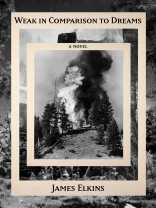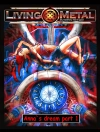For years, Samuel Emmer has monitored bacteria levels in drinking water for the small city of Guelph.
He is content to focus on dangerous life-threatening single-celled organisms as his grasp on his own life recedes—and with it, family and friends. To be sure, it is more than a little surprising when Samuel learns that he has been appointed to the city’s Zoo Feasibility Committee. Even more so, that he is being tasked with interacting not just with animals, but human beings. His assignment: travel to zoos around the world and gather information on the stereotypical behavior of animals in their enclosures—the city of Guelph aspiring commendably, if naively, to a cruelty-free habitat for its animals. It is in Tallinn, Estonia, that the dreams start for Samuel. He is in a vast wooded landscape; there is a fire burning in the distance; and it is coming his way…
Weak in Comparison to Dreams, by the historian and art critic James Elkins, is like no other novel you have ever read, even as certain inspirations, from Sebald to Tokarczuk, are clear. With an astounding breadth of knowledge and playful courage, Weak in Comparison to Dreams reignites our love for the ambitious novel with experimentation that never lacks intention, and whose empathetic scope explores the deepest aspects of our individual humanity.
Über den Autor
James Elkins is Chair of the Department of Art History, Theory, and Criticism at the School of the Art Institute of Chicago. He is an art historian and critic as well as a recognized authority on the experimental use of images in works by W.H. Sebald and Anne Carson to Claudia Rankine and Teju Cole. Elkins grew up in Ithaca, New York and for the last twenty years he has lived, studied, and taught in Chicago, Illinois. He is the author of several books on fine art and photography which focus on the history and theory of images in art, science, and nature. Weak in Comparison to Dreams is his first novel.












